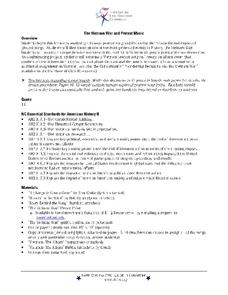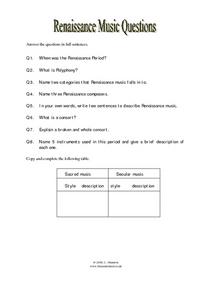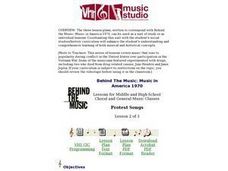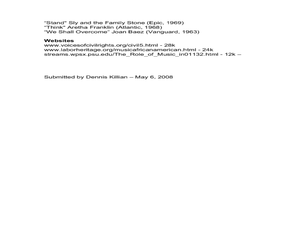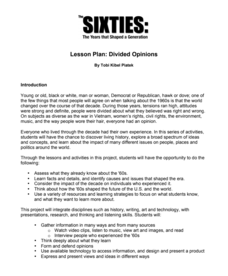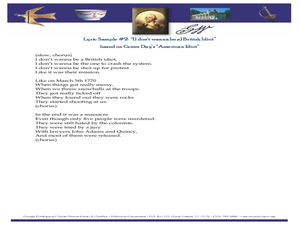National Endowment for the Humanities
The Freedom Riders and the Popular Music of the Civil Rights Movement
The Civil Rights Movement of the 1960s marched to its own beat—literally. Using songs from the era, as well as other primary sources such as King's "I Have a Dream" speech, class members analyze lyrics to discover how music and protest...
National Constitution Center
Born in the U.S.A: Music as Political Protest
Though often used in shows of patriotism, Bruce Springsteen's 1985 song "Born in the U.S.A." is critical of America's role in the Vietnam war and its treatment of American veterans. High schoolers analyze the song's lyrics in an activity...
Carolina K-12
The Vietnam War and Protest Music
Here's a must-have resource for your Vietnam War curriculum file. Class members view a PowerPoint that details the background of the conflict and then examines the reasons for and the effects of protest songs on American attitudes toward...
National Woman's History Museum
Songs of Protest: Seneca Falls to Vietnam
Long before the songs of the 1960's Peace Movement, long before the songs of the Civil Rights Movement, and even before the songs of the Abolition Movement, were the songs of the Suffrage Movement. To understand the power of protest...
Curated OER
Protest Music Video
Young scholars use iMovie to express the meaning and context of a protest song from the '60s or '70s. They explore different views of the protest movement and gain an understanding of the emotional and political overtones of the times.
PBS
Breaking the Code: Actions and Songs of Protest
Ezell Blair, Jr., David Richmond, Franklin McCain and Joseph McNeil changed history. Their sit-in at the lunch counter of the Woolworths in Greensboro, North Carolina on February 1, 1960 became a model for the nonviolent protests that...
Curated OER
Renaissance Music Questions
Add a comprehension resource to a unit on the Renaissance or music of the Renaissance period. Middle schoolers answer eight comprehension questions and complete ten additional questions in order to fill out a crossword puzzle.
Curated OER
Concept Formation Lesson Plan: Understanding "Protest"
After analyzing both examples and non-examples of a variety of protests conducted by ethnic groups in Seattle and the state of Washington during the twentieth century, your class members will work to identify the key ideas and components...
Center for Civic Education
The Power of Nonviolence: Music Can Change the World
Here is a fantastic activity through which class members discover how music has the ability to influence others in a meaningful way. After reviewing selected pieces and modern-day protest songs, learners will research other songs that...
Curated OER
The Art of Social Protest
Learners investigate how art and music define and unify a social movement. They decide how art and music can act as symbols of protest. They view both contemporary and historical examples of art as a tool for protest and design an art...
Curated OER
Protest Music Video
High schoolers create an iMovie that expresses the meaning of a protest song from the 1960's or 1970's. They investigate the emotional and political overtones of the times and use images to interpret the song's meaning.
Curated OER
"Uncle Sam's Got Himself in a Terrible Jam": Protest Music and the Vietnam War
"And it's one, two, three...what are we fighting for?" Use music to assess the climate of protest during the Vietnam War, listening to and analyzing Country Joe MacDonald's "I-Feel-Like-I'm-Fixin'-To-Die Rag" (lyrics included)....
VH1
Lessons for Hight School Music Classes: Lesson 2
Art and music have been vehicles for statements of civil unrest for hundreds of years. Upper graders critically analyze several pop songs or music movements from the 1980s that exemplify politically charged motives. They analyze lyrics...
PBS
The Sixties: Dylan Plugs in and Sells Out
Before Woodstock, there was Newport. Get plugged in to the social changes of the 1960s with a lesson that looks at Bob Dylan's performance at the 1965 Newport Folk Festival as a symbol of the radical changes that marked the era.
Curated OER
25 Greatest Protest Songs - Lesson 3
Students analyze the lyrics of protest songs as a catalyst for social change. They discuss the influence of music on behavior and explain the use of music as a means of self-expression.
Curated OER
Protest Songs
Students analyze and perform an American social protest song. They describe its historical setting, consider the effectiveness of the music and recognize that popular music is a reflection of American culture.
Curated OER
Rockin’ the World: Rock and Roll and Social Protest in 20th Century America
Students explore protest songs. In this interdisciplinary lesson, students examine issues-based music by summarizing lyrics and revealing inferences, generalizations, conclusions, and points of view found in the songs.
Curated OER
Understanding the Music of the Civil Rights Movement
Learners examine protest music and songs from the Civil Rights movement. In this music of the Civil Rights era lesson, students listen to selected music before working in groups to determine who the music was directed at, what social...
Curated OER
25 Greatest Protest Songs
Students view and discuss The 25 Greatest Protest Songs video as compiled by VH1. They focus on when and why each of the songs were written, looking for patterns.
Curated OER
1960's Protest Songs
By learning about 1960's protest songs, and the politics of the era, students can broaden their understanding of music and history.
PBS
Lesson Plan: Divided Opinions
To gain a more in-depth understanding of the tumultuous 1960s, young historians examine video clips, listen to music, examine images, and interview survivors. Once they have a foundation of information about the period, class members...
Curated OER
American Colonists Protest Song
Students explore the role of protest songs. For this early American history lesson, students research the acts passed by the British that angered colonists. Students then listen to protest songs from contemporary American history prior...
Curated OER
Breaking the Code: Actions and Songs of Protest
Students listen to and discuss the purpose of protest music. They analyze an editorial cartoon related to Jim Crow and read questions from the literacy tests given to African-Americans. They work together to write a song about the...
Curated OER
Slices of American Pie: The 1960s Through Music
Eleventh graders examine political, cultural, and social movements through music. In this 1960s American history activity, 11th graders explore the music of the decade in order to better understand the complexity of the time period....




